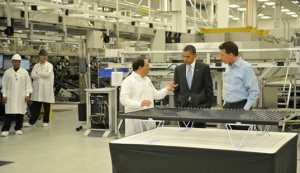 I’ve said it many times before: if something is economically tenable, it never needs to be subsidized, because the market will adopt it naturally. If something needs to be subsidized, it’s not economically tenable and should not be subsidized. Just recently, we’ve had the misfortune of witnessing yet again the reason that this is so.
I’ve said it many times before: if something is economically tenable, it never needs to be subsidized, because the market will adopt it naturally. If something needs to be subsidized, it’s not economically tenable and should not be subsidized. Just recently, we’ve had the misfortune of witnessing yet again the reason that this is so.
Solar energy will one day be tenable, but the technology (which incidentally the free market best fosters) is still many years out. Thus the latest in a long line of infuriatingly wasteful “green energy” debacles.
Debra Saunders, of the left-wing San Francisco Chronicle, explains:
Last year, President Barack Obama came to the Bay Area to tout “green jobs” at an event at solar panel manufacturer Solyndra’s Fremont plant. Quoth the president: “The true engine of economic growth will always be companies like Solyndra.”
On Wednesday, Solyndra announced it was shuttering its remaining Fremont factory, laying off 1,100 workers and filing for bankruptcy. It was a sorry day for the Bay Area.
I remember the day Obama came, May 26, 2010, vividly. Then-Gov. Arnold Schwarzenegger came to greet the president and wave to the hard hats. Venture capitalists preened. Just to show how brainy and farsighted the solar crowd is, Obama reminded the audience that his energy secretary, Steven Chu, is a Nobel Prize-winning physicist.
Rube that I am, I didn’t understand what Obamaland was thinking. Solyndra had not turned a profit since it was founded in 2005. The plant in which Obama stood was bankrolled with a $535 million federal loan guarantee. Two months before, PricewaterhouseCoopers questioned Solyndra’s “ability to continue as a going concern.”
If the president wants to send a positive message on the U.S. economy, I wondered, then couldn’t his people have found a California company that doesn’t rely on a federal loan and actually makes money?
Bad advance work, I figured.
A month later, Solyndra canceled a planned $300 million public offering. In November, Solyndra closed its older plant and cut its workforce. Today Solyndra’s lights are out.
Now I am wondering: Isn’t there some graybeard in the White House who — knowing that the president won’t look good if the tax-funded solar plant folds — does some digging to make sure the president’s choice of venue will not come back to haunt him?
Or could it be that Team Obama is composed of like-minded green true believers who insulate themselves from other points of view — much like the way, critics contended, George W. Bush was surrounded with yes men?
Consider: The administration continues to cling to its belief that green jobs are the jobs of the future, despite evidence to the contrary. A July study by The Brookings Institution found that green jobs account for 2 percent of American jobs — and Brookings used a generous definition, which included public-transit and waste-management jobs as green. Even still, Brookings found that green jobs grew at a slower rate (3.4 percent annually) than the national economy (4.2 percent) between 2003 and 2010.
Some Democrats have clued in. Rep. Maxine Waters, D-Calif., recently observed, “Of course we want to be part of the new innovation and green jobs. But you know, the green jobs have been about a lot of talk, and not a lot has been happening on that.”
But Team Obama won’t give up the dream.
Then again, the administration has friends in the green-titan community. Enter Oklahoma oil magnate George Kaiser, who raised at least $50,000 for the 2008 Obama campaign and is a frequent visitor to the White House. Kaiser was a top Solyndra investor.
In September 2009, Solyndra became the first recipient of an administration energy loan program that was part of the president’s stimulus package. A 2010 Government Accountability Office audit of the program found that five applicants, including Solyndra, bypassed required steps for funding. A Department of Energy spokesperson told The Washington Post that the GAO got it wrong.
The Solyndra decision baffled some industry experts, who questioned the viability of the company’s solar technology. “To think they could compete on any basis, that took a very big leap of faith,” solar analyst Ramesh Misra later told the Post.
The House Energy and Commerce Committee has been investigating the Solyndra deal — with little cooperation from the administration. Rep. Cliff Stearns, R-Fla., who chairs the investigative subcommittee, noted in a statement, “In an apparent rush to push stimulus dollars out the door, the Obama administration wasted $535 million in taxpayer funds in guaranteeing a loan to a firm that has proven to be unviable in the global market.”
Thursday, White House press secretary Jay Carney defended the loan program with its goal to “invest in cutting-edge technologies.”
The president, his Nobel Prize-winning energy secretary and Vice President Joe Biden (via satellite) participated in events that promoted Solyndra’s brand. In addition, Solyndra got to spend a half-billion in taxpayer dollars — and still the solar company couldn’t succeed.
Stearns and the committee’s chairman, Fred Upton, issued a joint statement that rang true. They said, “We smelled a rat from the onset.”
(Link)
